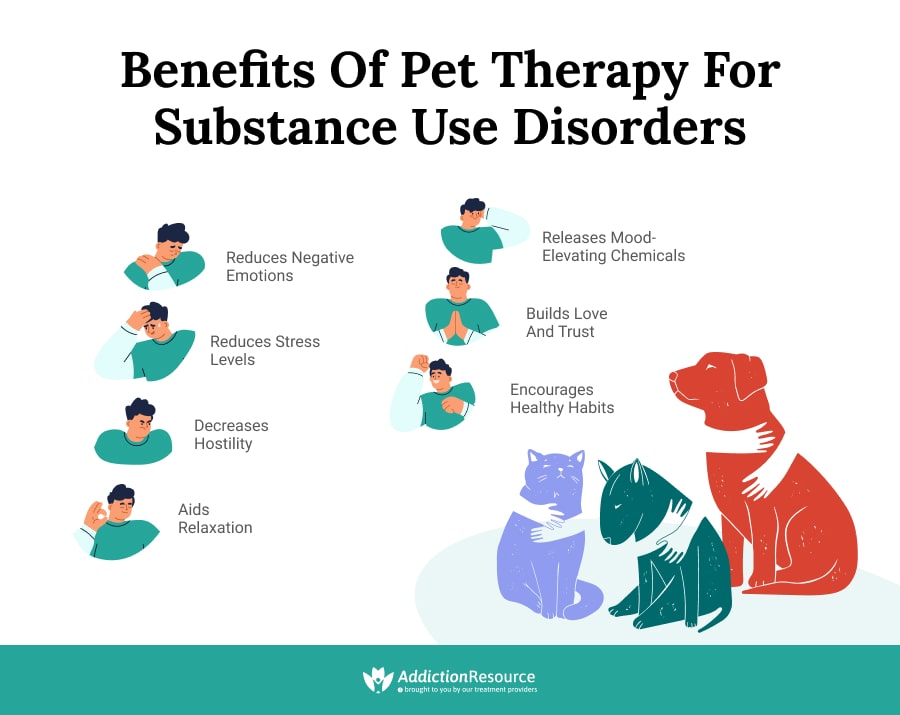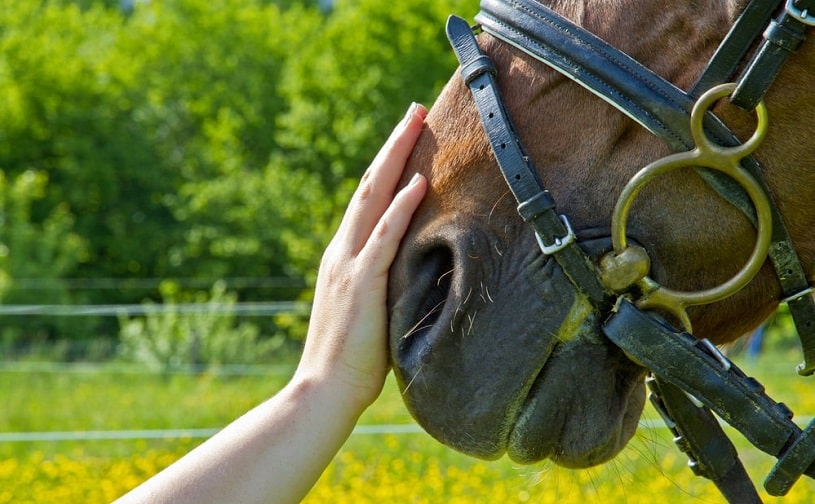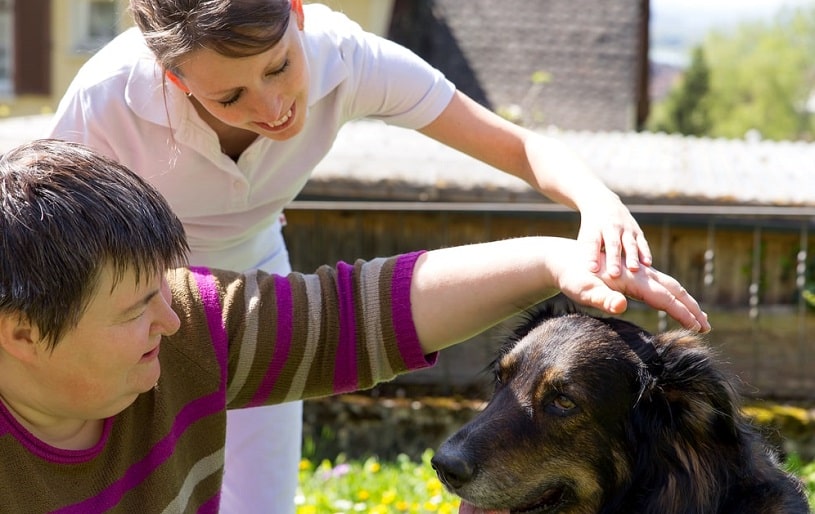The therapeutic use of animals dates back many centuries. Florence Nightingale recognized the healing impact of pet therapy and Freud noted that the presence of his pet dog in the room helped his patients relax. There are many emotional and psychological benefits of animal-assisted therapy, including decreased anger and loneliness, increased calmness and optimism, and a sense of being loved and wanted.
Table Of Contents:
Learn how a therapy dog, cat, or any other animal can help deal with substance abuse.
What Is Pet Therapy?
Pet therapy or animal-assisted therapy for substance use disorders is an umbrella term for many therapeutic and recreational activities that harness the healing power of animals. People in addiction treatment programs can benefit from the human-animal bond to assist them during their recovery. The dynamic and mutually beneficial relationship between people and therapy animals positively influences the recovering addict’s overall health and wellbeing.
How does animal-assisted therapy help recovering addicts? People with addictions to drugs or alcohol face many physical, mental, and emotional challenges. The neurotransmitters and receptors in their brains are accustomed to being artificially stimulated with drugs and alcohol. Therapy animals offer a safe and natural way to stimulate pleasure receptors in the brain. These animals also help the recovery process by encouraging the recovering addict to develop healthy bonds and become accountable for someone other than themselves.
Animal-assisted therapy (AAT) is not stand-alone addiction treatment, and it cannot replace evidence-based treatment modalities such as detox and counseling.
AAT is offered as part of a holistic recovery program. It is a goal-oriented, structured, and planned intervention. A specially trained healthcare provider (physician, physical therapist, social worker, or mental health professional) supervises an animal. Activities usually focus on social skills, motivation, and other addiction recovery goals.
Which Animals Usually Participate in AAT For Substance Abuse?
The most common therapy animals are dogs and horses, but other animals such as cats, rabbits, guinea pigs, and birds may also be beneficial for addiction treatment. There are even reports of people using ducks and llamas for animal-mediated addiction treatment. There is no specific research that compares the effectiveness of different animals in people with substance use disorders. However, researchers believe most therapy animals are equally effective.
Benefits of Animal-Assisted Therapy
Interactions between a recovering addict and a therapeutic animal under the supervision of a trained healthcare provider strengthen the bond between the patient and the provider. A strong working relationship between patient and provider is a good predictor of positive outcomes. The animal helps the patient develop mindfulness and overcome emotional dysregulation. AAT has been shown to boost mood, confidence, and communication skills, which are beneficial in the path to recovery from addiction. Therapy animals are also helpful for people with co-occurring mental health disorders such as PTSD.

However, animals can be helpful not only as a part of pet therapy. Having a pet at home will also bring many benefits. Ask any of the nearly 85 million American pet owners, and they’ll tell you that the company of animals has innumerable benefits. The calming purr of a pet cat or the ecstatic welcome from a beloved canine friend can lift a person’s mood in an instant. Research has shown that human-animal bonding can reduce anxiety, lower agitation, and improve overall health and wellbeing. In addition, AAT has shown benefits in relieving distress in cancer patients. But can pets help prevent substance abuse?
Here Is How Having Pets at Home Can Help Prevent and Battle Addiction:
Reducing Negative Emotions
People who experience negative emotions, such as anxiety, guilt, shame, and loneliness, are at a higher risk of drug or alcohol abuse. Unconditional love from a beloved pet has a calming effect, reduces the sense of isolation, and encourages a positive attitude to life.
Boosting Mood
Studies have shown that playing with a pet can boost mood by increasing the levels of dopamine, serotonin, and oxytocin, chemicals that stimulate the pleasure centers in the human brain. Animal interaction has also been shown to reduce the level of cortisol, a hormone that is related to stress. People use drugs to feel good. A pet is a healthy way to experience the same positive emotions and mood.
Coping with Stress
Petting a dog or cat reduces blood pressure and has a calming effect. One study found people with pet dogs and cats have a more stable heart rate and blood pressure during stressful situations than non-pet-owners. Stress is a well-known risk factor for developing substance use disorders. The ability of pets to help people handle stressful situations protects against addiction.
Responsibility
Lack of discipline is a risk factor for substance use. Pets help people learn many life skills, including developing a sense of responsibility and reducing impulsivity. Pet owners are responsible for another living being other than themselves. It promotes accountability and restraint and helps prevent addiction.
Healthy Habits
A dog needs to be walked regularly. A cat may insist its owner chase a string in the backyard. Owning a pet gives cause to exercise and maintain a daily routine. It leaves less time for the pet owner to hang out with the wrong company or engage in unhealthy habits. Pets help prevent substance abuse by promoting healthy habits and good lifestyle choices.

Efficacy Of AAT
According to the 2014 study by Kamioka and Okada, animal therapy with dogs, cats, horses, dolphins, birds, rabbits, and guinea pigs is an effective treatment for alcohol and drug addiction and mental health disorders such as depression and schizophrenia. One could say pets make excellent therapists. Interaction with animals is known to heal broken bodies and minds.
Specific research on animal therapy for addiction is limited. Still, the Department of Psychology of Emory University research has shown impressive results with various animals, ranging from common household pets (dogs, cats, and horses) to exotic animals (dolphins and elephants) helping in the treatment of many psychological disorders.

A 2016 study by Dr. Lindsay Madden Ellsworth of the University of Washington confirmed the benefits of animal interaction during treatment for addiction. The study found reduced hostility and sadness in adolescent boys who underwent weekly 1-hour sessions of interaction with a therapy dog during inpatient treatment for substance abuse. The author of the study concluded animals are a significant asset in addiction recovery.
Equine-Assisted Treatment
Equine-assisted therapy is a type of animal-assisted therapy in which horses are an integral part of the treatment process. Horses can help addicts work through their emotional and psychological issues, which led to substance abuse. Interestingly, some of these issues are not addressed by traditional psychotherapy. Therefore, equine-mediated treatment is offered as a complementary treatment to conventional modalities such as detoxification and psychotherapy.
Horse-facilitated activities are growing in popularity as a therapeutic modality for substance use disorders. This treatment approach requires recovering alcoholics or addicts to regularly perform various mutually beneficial activities involving horses, including riding, handling, grooming, walking or trotting, and lunging (training) these animals under the direction of a licensed mental health professional with credentials in equine-facilitated treatment.
Patients learn to interact with others in a healthy way and build trust. Individuals trying to quit drinking or stop using drugs can develop a deep connection and feel a sense of acceptance from the animal. The horse serves as a mirror, a metaphor, and a means of self-reflection. This type of pet therapy offers a chance to build attachments with a safe, non-judgmental partner. Addicts develop a positive relationship without fear of criticism, which aids the recovery process. In addition, interaction with horses may open up conversations with the therapist about psychological and social issues that led to the person’s addiction.
Benefits of Equine-Assisted Therapy for Recovering Addicts:
- Reduced aggression
- Reduced anxiety and depression
- Improved self-esteem and confidence
- Developing healthy relationships
- Developing connections to the natural world
- Developing nonverbal communication skills
Horse-assisted treatment is frequently offered as part of experiential rehab for alcoholics and drug addicts. Horses bring unique qualities to the sessions. Interactions between recovering addicts and horses allow them to form healthy relationships and nonverbal awareness.
Therapy Dog For Addiction Treatment
Dogs are the most commonly used animals in animal-facilitated treatments for people with substance use disorders. A therapy dog will be gentle, calm, interactive, and observant. They can be trained in agility and obedience. It makes them ideal for drug abuse treatment. Therapy dog activities include physical and verbal interactions such as feeding, talking, grooming, petting, training, and playing with the animal.
Dogs help recovering addicts develop trust, establish boundaries, and gain self-esteem. In addition, they improve problem-solving and communication skills.
During sessions with dogs, people struggling with addiction learn to relate to others and overcome emotional and physical distancing, which is extremely important during interactions with new support networks for sobriety, such as 12-step meetings. Recovering addicts develop interest, focus, and motivation. This positive attitude resulting from canine-assisted treatment sessions is incredibly beneficial in recovery.

Observing an addict’s interaction with dogs helps therapists identify unhealthy coping mechanisms and educate the client on better choices, thereby reducing the likelihood of turning to drugs or alcohol in response to life’s challenges. Research shows that a therapy dog can lower stress without compromising traditional therapeutic mechanisms and improve long-term outcomes of psychotherapy, including CBT, which plays a major role in treatment for addiction.
Interaction with dogs helps reestablish the natural neurochemical pathways in the brain. Mood-enhancing chemicals, such as oxytocin, dopamine, serotonin, and endorphins are released during human-dog interactions. Dog-assisted treatment is a healthy, sustainable way to experience positive emotions and develop good habits and routines. Ultimately, all these behaviors help reduce dependence on alcohol and drugs.
Therapy Cat and Substance Use Disorder Treatment
While dogs are the obvious choice for animal-assisted therapy, feline therapists have their advantages. These soft, furry animals make excellent companions as house pets and benefit people undergoing treatment for addiction. The presence of a therapy cat during sessions has been shown to reduce depression and anger and improve attention and social skills, all of which can help a recovering addict on the path to sobriety.
How can cats help individuals in recovery? Interaction with a therapy cat can calm the nerves and improve mood. Human-feline interplay releases serotonin in the human brain, a chemical that instills a sense of wellbeing. It also reduces cortisol, the hormone associated with stress. Therefore, cats treat stress and anxiety, which can predispose an individual to substance use problems. According to SAMHSA, people with mental health disorders are more likely to experience addiction, and integrated treatment of both conditions is the best approach.

Companion animals during drug rehab provide many benefits. For this reason, some drug rehab facilities allow clients to bring their pet cat with them. The presence of a feline companion can enable the recovering addict to feel less lonely and more emotionally supported while undergoing addiction treatment. The 2012 study on psychosocial and psychophysiological effects of human-animal interactions has shown that the presence of an animal has a positive impact on a person’s attitude, sense of responsibility, self-esteem, and focus. Interactions with cats during rehab can improve social interactions, help develop trust and reduce aggression.
Where to Get Animal Therapy For Addiction?
Many drug rehab facilities offer animal treatment as part of a comprehensive addiction recovery program. In addition, some associations and organizations specialize in animal-assisted therapy. Volunteers work with patients and therapy animals under the supervision of healthcare providers.
- Pet Partners, a leader in pet therapy interventions, was founded in 1977 and has been providing interactions with dogs, cats, horses, pigs, guinea pigs, birds, alpacas/llamas, rats, and rabbits for the last four decades. Volunteer pet owners are put through a handler course, and a veterinarian check is performed on the therapy animal to confirm good health.
- Animal Assisted Intervention International is a non-profit organization that supports activities, programs, training, handling, and education for positive interactions between animals and people. The organization’s website has a search tool for therapists around the world.
- Canine Therapy Corps provides free animal-assisted therapy services in the Chicago metropolitan area. The focus is on harnessing the strength of the human-animal bond through goal-directed interactive programs. It helps people in recovery overcome personal challenges. Dogs work as a team with volunteers and provide motivation and positive feedback during sessions.
Animals Making Recovery from Substance Abuse Easier
Experiential therapy with animals is known to help recovering addicts feel more comfortable and less guarded and anxious during sessions.
Pet therapy improves sociability, communication skills, responsibility, compassion, and trust. In addition, recovering addicts learn to be less impulsive and develop improved coping skills and problem-solving strategies from these sessions.
Many people find that their interactions with animals during substance abuse treatment are transformative. Most recovering addicts report a positive experience with better rapport with their therapist, reduced anxiety, and increased success in recovery.
AAT can be combined with almost any type of traditional psychotherapy. It can be used in various settings, including outpatient drug rehab facilities, private offices, and residential rehabs. As part of a comprehensive drug rehab plan, animal-assisted therapy can significantly benefit individuals undergoing addiction treatment when conducted by a trained health provider. This type of treatment can also improve the symptoms of co-occurring mental health conditions and make a recovery from substance abuse successful in the long run.
Hope Without Commitment
Find the best treatment options. Call our free and confidential helpline
Most private insurances accepted
Page Sources
- NIH News in Health, The Power of Pets. https://newsinhealth.nih.gov/2018/02/power-pets
- NIDA, The Science of Drug Use: A Resource for the Justice Sector, 2020. https://www.drugabuse.gov/drug-topics/criminal-justice/science-drug-use-resource-justice-sector
- Sinha, R. (2008). Chronic stress, drug use, and vulnerability to addiction. Annals of the new York Academy of Sciences, 1141, 105. https://www.ncbi.nlm.nih.gov/pmc/articles/PMC2732004/
- University at Buffalo, Pet Dog Or Cat Controls Blood Pressure Better Than ACE Inhibitor, UB Study Of Stockbrokers Finds. http://www.buffalo.edu/news/releases/1999/11/4489.html
- Kamioka, H., Okada, S., Tsutani, K., Park, H., Okuizumi, H., Handa, S., ... & Mutoh, Y. (2014). Effectiveness of animal-assisted therapy: A systematic review of randomized controlled trials. Complementary therapies in medicine, 22(2), 371-390. https://pubmed.ncbi.nlm.nih.gov/24731910/
- Madden Ellsworth, L., Tragesser, S., & Newberry, R. C. (2016). Interaction with shelter dogs reduces negative affect of adolescents in substance use disorder treatment. Anthrozoös, 29(2), 247-262. https://www.tandfonline.com/doi/abs/10.1080/08927936.2016.1152719
- Hunt, M. G., & Chizkov, R. R. (2014). Are therapy dogs like Xanax? Does animal-assisted therapy impact processes relevant to cognitive behavioral psychotherapy?. Anthrozoös, 27(3), 457-469. https://www.researchgate.net/publication/263046840_Are_Therapy_Dogs_Like_Xanax_Does_Animal-_Assisted_Therapy_Impact_Processes_Relevant_to_Cognitive_Behavioral_Psychotherapy
- MentalHealth.gov, Mental Health and Substance Use Disorders, 2019. https://www.mentalhealth.gov/what-to-look-for/mental-health-substance-use-disorders
- Pets Are Wonderful Support, The Health Benefits of Companion Animals. https://www.nps.gov/goga/learn/management/upload/Comment-4704-attachment_.pdf
- Beetz, A., Uvnäs-Moberg, K., Julius, H., & Kotrschal, K. (2012). Psychosocial and psychophysiological effects of human-animal interactions: the possible role of oxytocin. Frontiers in psychology, 3, 234. https://www.ncbi.nlm.nih.gov/pmc/articles/PMC3408111/

 Authored by
Authored by  Reviewed by
Reviewed by 
